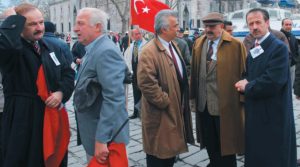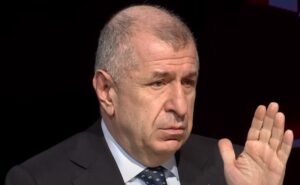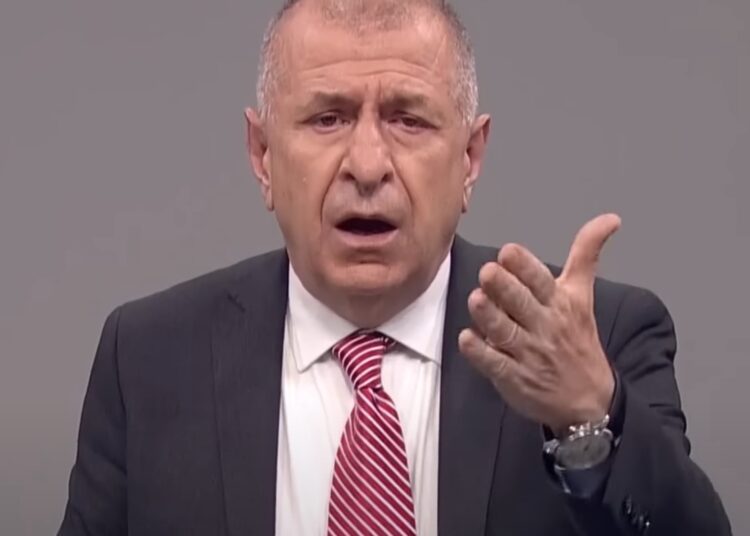Abdullah Bozkurt/Stockholm
Turkey’s ultra-far-right, anti-West and racist politician Ümit Özdağ has been revealed as a long-time operative of Turkey’s “deep state,” a term that refers to secretive nationalist and neo-nationalist elements within the influential Turkish military, police and intelligence apparatus, which operate with impunity to manipulate public opinion and shape politics. Their methods often involve illegal, extrajudicial and at times brutal operations.
Özdağ, a 62-year-old politician who now leads the far-right Victory Party (Zafer Partisi), has a history of close collaboration with neo-nationalist generals from the once-powerful military. He has been reported to have ties to intelligence agency MIT and the National Security Council (MGK), commonly referred to as the shadow government that discreetly influences key policies in Turkey from behind a heavy veil of secrecy.
At present, this relatively obscure politician is actively engaged in a clandestine mission on behalf of Turkish President Recep Tayyip Erdogan. His mandate involves undermining the opposition, diverting the national agenda away from Erdogan’s adversaries, creating significant distractions for the public to take attention away from genuine problems such economic hardship, and striving to sow factionalism within Turkish politics. In essence, he is carrying out the directives of the nation’s strongman, Erdogan, while publicly maintaining the façade of opposition to his repressive rule.
While the primary issue he exploits revolves around Syrian, Afghan and other migrants and refugees, for whom he advocates expulsion, Özdağ publicly endorses several other controversial ideas. These include shutting down Incirlik Air Base for US and NATO deployments, establishing an exile government for Turks in the Western Thrace region of Greece and activating the S-400 Russian long-range missiles purchased from Moscow. In doing so, he actively supports Erdogan’s anti-Western, nationalist agenda and keeps voters preoccupied with heightened nationalist fervor, taking advantage of the propensity of Turks to respond to such sentiments.
This is not the first instance of Özdağ resorting to duplicity and engaging in double-dealing politics. He has honed his skills in guile, deception and disinformation warfare. In the past, he held secret meetings with representatives of the outlawed Kurdistan Workers’ Party (PKK), which is designated as a terrorist organization by Turkey and much of the international community. All the while he maintained the public facade of a staunch Turkish nationalist.
Secret intelligence report on the activities of Ümit Özdağ:
A leaked secret report drafted by Turkish intelligence agency MIT in May 2011 revealed that Özdağ had met with senior PKK figures in both Turkey and the United States. These meetings were arranged by Mehmet Mehmetoglu, a businessman residing in Diyarbakır, known to act as a go-between for the PKK. The MIT report, dated March 4, 2003, also noted that Özdağ received an invitation to visit PKK headquarters in the Kandil Mountains of northern Iraq, extended by PKK leader Murat Karayılan.
According to the report, citing a “sensitive source,” the meeting occurred on November 15, 2002, at Özdağ’s office. Present at the meeting were Özdağ and İrfan Güler, a PKK member who had previously been convicted of terrorism and served time in prison. During the meeting Güler assured Özdağ that the encounter would remain confidential. Notably, Özdağ had previously met with PKK representatives in the United States back in 1997 and had expressed his desire for such meetings to continue.
According to the MIT report, Özdağ informed his PKK contacts that he would seek consultation with higher-echelon individuals, a reference to senior figures within the Turkish state’s security establishment. The report emphasized that the PKK believed Özdağ had significant connections within the Turkish “deep state” and saw potential value in involving him in negotiations with the Turkish government.
When the report was leaked to the press in 2011, Özdağ, as expected, resorted to denial tactics. He vowed to bring lawsuits against journalists who had published and disseminated the report but never followed through. This reluctance stemmed from his fear that the document would be authenticated during court proceedings.
Fast forward to 2020, when the report resurfaced, with Özdağ changing his narrative. He admitted to its authenticity and claimed that he had reported to both MIT and the MGK, operating under a secret authority granted to him by the Turkish state. In essence, he acknowledged his involvement in intelligence-related work.
Brig. Gen. Veli Küçük, the founder of an illegal intelligence unit within the gendarmerie, admits plot to endorse Ümit Özdağ:
Özdağ’s admission comes as no surprise, considering his history of playing similar roles for the state. In a 2009 criminal investigation into a neo-nationalist group known as Ulusalcı or Avrasyacı in Turkish, investigators uncovered Özdağ’s close coordination with formerly influential generals who held strongly anti-Western and anti-NATO views. These generals advocated for closer ties with Russia, China and Iran.
More notably, he had collaborated with Brig. Gen. Veli Küçük, the founder of an illegal intelligence unit within the gendarmerie, operating under the Gendarmerie Intelligence Group Command (JITEM). JITEM is infamous for its involvement in extrajudicial murders and executions, particularly in predominantly Kurdish provinces. Küçük was indicted, convicted and served time in prison from 2009 to 2014. However, he managed to secure his release, thanks to an amnesty granted by Erdogan, who formed an alliance with the neo-nationalists in 2014.
The investigation into Küçük revealed a series of secret meetings between him and Özdağ that took place between 2004 and 2006. These meetings were aimed at facilitating Özdağ’s ascension to chairmanship of the far-right Nationalist Movement Party (MHP), thereby ousting Devlet Bahçeli from leadership. However, this plot failed when the MHP expelled Özdağ from the party. Consequently, Bahçeli managed to retain his position as leader of the MHP during a party convention held on November 19, 2006. Küçük later admitted to this plot in his statement to a prosecutor.
The criminal investigation into the neo-nationalist group had also intercepted a series of phone conversations between Özdağ and Güler Kömürcü, another neo-nationalist who was indicted and convicted on terrorism charges. In one phone wiretap recorded on December 26, 2007, Özdağ and Kömürcü were overheard discussing changes in promotions and assignments within MIT.
In another criminal investigation, a cache of secret documents retrieved from computers of the General Staff Directorate for Information Support (Bilgi Destek Daire Başkanlığı), also known as the a psychological and influence operation (PSYOP) unit, was presented to the court in Istanbul on December 26, 2012. These documents listed Özdağ and three other individuals (Ercan Çitlioğlu, Ali Nihat Özcan and Emin Gürses) as assets who would be directed to work on shaping and influencing public opinion. The documents covered the period between April and June 2009, a time when the Office of the General Staff was under the influence of neo-nationalist generals.

During that period, the PSYOPs were overseen by Dursun Çiçek, a convicted colonel known for his anti-NATO views. Acting under the directives of then-Chief of General Staff Gen. Mehmet İlker Başbuğ, Çiçek orchestrated the creation of numerous fake websites to disseminate far-right content, particularly anti-US, anti-Semitic and anti-minority views, among the Turkish public. A report from the police department’s cybercrime unit concluded that the documents resembled the conspiratorial, racist and xenophobic content published on several fringe websites. The investigation further uncovered that the military was, in fact, covering the hosting fees for these websites.
Özdağ’s ideological views closely align with his family’s experience. He was raised in a military family and nurtured by his father, Muzaffer Özdağ, who was a member of the National Unity Committee (Milli Birlik Komitesi, MBK). The MBK replaced the elected government after a military coup in 1960, which tragically led to the execution of then-prime minister Adnan Menderes by hanging on orders from the military junta. Due to internal disagreements within the junta after the civilian government’s removal, Özdağ’s father was sent to Japan as the embassy military attaché. It was during this period that Özdağ Junior was born in Japan, and the family returned to Turkey when he was three years old. The father was closely involved in far right nationalist politics and worked together with former Turkish Army colonel Alparslan Türkeş, who had become leader of the Republican Villagers Nation Party (CKMP) in 1965, later renamed the MHP.
Following in his father’s footsteps, Özdağ was actively engaged with the far-right party MHP’s youth branches, including the Gray Wolves, during his youth. His involvement led to his dismissal from high school. However, he persevered by continuing his education in other schools and eventually pursued higher education, earning a Ph.D. He later established the Center for Eurasian Strategic Studies (Avrasya Stratejik Araştırmalar Merkezi, ASAM) with guidance from the military’s neo-nationalist generals. ASAM received substantial funding from Yıldız Holding, widely recognized for its Ülker brand as Turkey’s leading biscuit and chocolate producer.

His close ties to neo-nationalist generals in the army were further exposed when the police conducted raids on the office and residence of retired general Mehmet Şener Eruygur, who was leading the Atatürkist Thought Association (ADD), a neo-nationalist organization known for its extreme anti-minority and anti-Western stance.
Documents seized from Eruygur revealed recorded conversations with Özdağ, who was identified as a significant asset in need of support. Dated February 2004, one such conversation revolved around the establishment of a neo-nationalist media outlet and strategies for financing it. During this conversation, it was mentioned that Tuncay Özkan, a neo-nationalist politician, could potentially establish a television network to promote their views. In fact, Özkan did establish a television station called Kanaltürk in June 2004, just months after this discussion took place.
Özkan, who faced indictments and convictions in criminal trials spanning 2009 to 2014, managed to evade legal troubles following an alliance formed between the neo-nationalists and Erdogan in the aftermath of the December 2013 corruption scandals, which implicated Erdogan and his close associates. Currently a member of the main opposition Republican People’s Party (CHP), Özkan has been clandestinely collaborating with Erdogan to undermine the opposition in Turkey, much like Özdağ.
Özkan is the actual owner of the Güneşim Medya Yayıncılık A.Ş. media company, which oversees operations such as the Anka news agency, KRT (Kültür ve Radyo Televizyon) TV and the İkinci Yüzyıl digital newspaper. It’s no surprise that Özdağ is frequently featured as a guest at these media outlets, amplifying his views.
In July Özdağ disclosed that he had a secret agreement signed with CHP leader Kemal Kılıçdaroğlu. This agreement would have transferred control of the Turkish intelligence agency to his Victory Party in the event that Kılıçdaroğlu assumed power in the presidential election. Furthermore, Özdağ mentioned that the CHP leader had promised him three ministerial posts in the new cabinet. Following this revelation, Kılıçdaroğlu also confirmed the existence of the secret deal.












